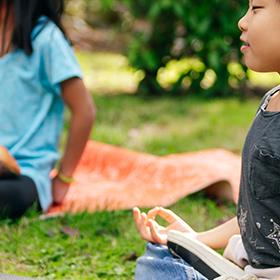Montessori FAQs
Montessori is an education philosophy and approach to learning that begins at a child’s birth and continues through young adulthood. The Montessori Method is built on core beliefs and practices that may be new to you. Here are some of the things we’re asked about most often.
What ages do Montessori schools serve?
How many students are typically in a Montessori class?
Why do Montessori teachers encourage my young child to be independent?
Can Montessori accommodate gifted children? What about children with other special learning needs?
Do Montessori teachers follow a curriculum?
Is it true that Montessori students are free to do whatever they want, and at their own pace?
If children work at their own pace, don't they fall behind?
Why are Montessori schools all work and no play?
Is it true that Montessori students have the same teacher for all subjects?
Do Montessori schools assign homework?
I’ve heard that Montessori teachers don’t really teach. Is this true? If so, what do they do?
Why don’t Montessori teachers give grades?
Is there such a thing as public Montessori school?
Do Montessori students take standardized tests?
Should I keep my child in Montessori as he graduates to higher grade levels?
What will my Montessori child do if there isn’t a higher-level program for her to transition into?
How well do Montessori students do compared to students in non-Montessori schools?
What ages do Montessori schools serve?
Currently, most Montessori programs begin at the Early Childhood level (for children ages 2.5 – 6 years). However there are also programs for infants and toddlers (birth – age 3), Elementary-aged children (ages 6 – 12), and Secondary students (ages 12 – 18). Some schools refer to the first part of the Secondary level as Middle School (ages 12 – 15) and the second part as High School (ages 15 – 18).
The benefits of Montessori—the emphasis on independent learning, for example, and the warm, supportive community—continue to be important at each stage of development as children grow into lifelong learners and responsible citizens of the world.
How many students are typically in a Montessori class?
Unlike some private schools, which strive for very small classes, Montessori values the lessons of community that can happen when the size of the class is somewhat larger. A larger, multi-age class can encourage students to rely on themselves and their peers as resources, rather than going directly to a teacher for support first.
Montessori classes at the Early Childhood level and above might include 20 – 30 students whose ages span 3 years. All members of the community benefit from this configuration. Older students are proud to act as role models; younger ones feel supported and gain confidence about the challenges ahead. And all children develop their independence as they problem solve with their peers within their classroom community.
Classes for infants and toddlers are smaller, with typically 10 – 15 children. Often the teacher-to-child ratio for this youngest age group is set by state licensing standards.
Why do Montessori teachers encourage my young child to be independent?
Helping a child develop independence and self-sufficiency is a hallmark of Montessori programs. Children who are independent and make self-directed choices develop self-confidence and experience pride when they accomplish their goals.
In the Montessori classroom, young children are supported to become autonomous in caring for their personal needs and in taking care of their classroom environment. Children are given freedom of movement and choice over their activities in the classroom and are encouraged and supported to “do it for themselves.”
Montessori students are self-confident learners who believe in their own abilities to accomplish a task. This confidence and self-reliance sets the stage for all future learning.
Can Montessori accommodate gifted children? What about children with other special learning needs?
An advantage of the Montessori approach—including multi-age classrooms with students of varying abilities and interests—is that it allows each child to work at his or her own pace. Students whose strengths and interests propel them to higher levels of learning can find intellectual challenge without being separated from their peers. The same is true for students who may need extra guidance and support, including students with special needs such as ADHD, learning differences, and autism spectrum disorders: each can progress through the curriculum at her own comfortable pace, without feeling pressure to “catch up.”
From a Montessori perspective, every child is considered gifted, each in his own way. Every child has unique strengths and interests that the Montessori environment nurtures and supports.
Do Montessori teachers follow a curriculum?
Montessori schools teach the same basic skills as traditional schools, and offer a rigorous academic program. Most of the subject areas are familiar—such as math, science, history, geography, and language—but they are presented through an integrated approach that weaves separate strands of the curriculum together.
While studying a map of Africa, for example, students may explore the art, history, and inventions of several African nations. This may lead them to examine ancient Egypt, including hieroglyphs and their place in the history of writing. And the study of the pyramids is a natural bridge to geometry!
This approach to curriculum demonstrates the interrelatedness of all things. It also allows students to become thoroughly immersed in a topic—and to give their curiosity full rein.
Is it true that Montessori students are free to do whatever they want, and at their own pace?
Dr. Maria Montessori observed that children are more motivated to learn when working on something of their own choosing, and at their own unique pace. A Montessori student may choose her focus of learning on any given day, but her decision is limited by the materials and activities—in each area of the curriculum—that her teacher has prepared and presented to her.
Beginning at the Elementary level, students typically set learning goals and create personal work plans under their teacher’s guidance.
If children work at their own pace, don't they fall behind?
Although students are free to work at their own pace, they’re not going it alone. The Montessori teacher closely observes each child and provides materials and activities that advance his learning by building on skills and knowledge already gained. This gentle guidance helps each child master the challenge at hand—and protects him from moving on before he’s ready, which is often what causes children to “fall behind.” Each child is challenged appropriately in each area of the curriculum to ensure that skills and competencies are fully developed and that the child is able to pursue his own unique interests.
Why are Montessori schools all work and no play?
This is a common misunderstanding of Montessori education. Dr. Montessori realized that children’s play is their work—their effort to master their own bodies and environment—and out of respect she used the term “work” to describe all their classroom activities. Montessori students work hard, but they don’t experience it as drudgery; rather, it’s an expression of their natural curiosity and desire to learn. They engage in these activities with joy and focus—intent on mastering new skills independently!
Is it true that Montessori students have the same teacher for all subjects?
Montessori teachers are educated as “generalists,” qualified to teach all sections of the curriculum. But many schools also choose to employ specialists in certain subjects, such as art, music, foreign language, physical education, and science.
Do Montessori schools assign homework?
It is unusual for the youngest students to receive homework. Generally, parents can expect that as students mature through the grade levels they will be given homework. When this happens, students are expected to spend approximately 20 – 40 minutes completing the task on their own. Young children (ages 6 – 8) may be asked to read to their parents, or complete a project that is started at school. As students move through the Montessori program, more responsibility for completing homework is expected.
I’ve heard that Montessori teachers don’t really teach. Is this true? If so, what do they do?
When you observe a Montessori teacher at work you may be surprised! You will not see her standing in front of the classroom teaching the same lesson to the entire class, because the Montessori curriculum is individualized to the needs, interests, and learning style of each child. Often you will find her on the floor, working with an individual child. With the older children, she may be giving a small group lesson, or demonstrating a lesson or activity that the students will then complete on their own.
One of the many roles of the Montessori teacher is to observe each child and the classroom community as a whole and make adaptations to the environment and lesson-planning as needed to support each child’s development. As the Montessori teacher observes, he is determining when and how to introduce a new challenging lesson to a student, and when to review a previous lesson if a skill has not yet been mastered.
While a Montessori student may choose her activities on any given day, her decisions are limited by the materials and activities in each area of the curriculum that the teacher has prepared and presented to her. The teacher’s observations inform each child’s personalized learning plan and allow each child to move through the curriculum at an appropriate pace and level of challenge.
Why don’t Montessori teachers give grades?
Montessori students typically do not receive letter or number grades for their work. Grades, like other external rewards, have little lasting effect on a child’s efforts or achievements. The Montessori approach nurtures the motivation that comes from within, kindling the child’s natural desire to learn.
A self-motivated learner also learns to be self-sufficient, without needing reinforcement from outside. In the classroom, of course, the teacher is always available to provide students with guidance and support.
Although most Montessori teachers don’t assign grades, they closely and continuously observe and assess each student’s progress and readiness to advance to new lessons. Most schools hold family conferences a few times a year so parents may see samples of their child’s work and hear the teacher’s assessment—and perhaps even their child’s self-assessment.
Is there such a thing as public Montessori school?
There is! More school districts are including Montessori programs as a parent choice. Currently, more than 500 public schools nationwide offer Montessori programs. Public Montessori education is a popular option for preschool through high school students attending all types of publicly funded schools—neighborhood, magnet, and charter.
Because they are publicly funded, public Montessori schools are open to all children. They do not generally require incoming students to have prior Montessori experience; however, some restrict the admission of children without Montessori experience to lower Elementary levels only.
Students are often admitted to public Montessori programs by lottery because there tend to be more applicants than openings. While public Montessori programs are tuition-free, tuition may be charged for 3- to 4-year-olds in public school pre-kindergarten classes that are not fully covered by state funding. If required, pre-kindergarten tuition is usually paid on a sliding scale, depending upon the family’s eligibility for the National School Lunch Program (free, reduced, or full-pay).
Do Montessori students take standardized tests?
Public Montessori schools are mandated to administer the same standardized tests as other public schools.
Some private Montessori schools also administer standardized exams, particularly if they will be required by schools into which their students may transition. Other schools choose not to administer these tests.
Should I keep my child in Montessori as he graduates to higher grade levels?
The benefits of Montessori—the emphasis on independent learning, for example, and the warm, supportive community—continue to be important at each stage of development as children grow into lifelong learners and responsible citizens of the world. As your child matures in her school activities so will her independence, problem-solving abilities, social maturity, and academic skills.
At the higher levels levels, Montessori programs combine rigorous student-centered academic studies with purposeful work—often including out-of-classroom excursions such as service learning, internships, outdoor education, and entrepreneurship designed to cultivate global citizenship and civic responsibility—preparing students to become contributing adults who are self-confident and possess the skills needed to thrive as active citizens in society.
To assess what is best for your child’s next stage of development, speak with his teacher to discuss your child’s learning strengths, interests, and areas for development, and your –and the school’s—learning goals for him. Observe the higher-level classroom environments to see, firsthand, what your child will experience as she grows and ask to speak with parents of children in the next level to learn about their experiences.
What will my Montessori child do if there isn’t a higher-level program for her to transition into?
If your child transitions out of a Montessori environment to another type of program, she is likely to thrive socially and academically. Poised, self-reliant, and used to working harmoniously as part of a classroom community, students who move from Montessori typically adjust quickly to the ways of their new school.
How well do Montessori students do compared to students in non-Montessori schools?
A growing body of research comparing Montessori students to those in traditional schools suggests that in academic subjects, Montessori students perform as well as or better—academically and socially—than their non-Montessori peers. These benefits grow as children have more experience in a Montessori environment.
Most Montessori schools report that their students are typically accepted into the high schools and colleges of their choice. And many successful graduates cite their years at Montessori when reflecting on the important influences in their life.



